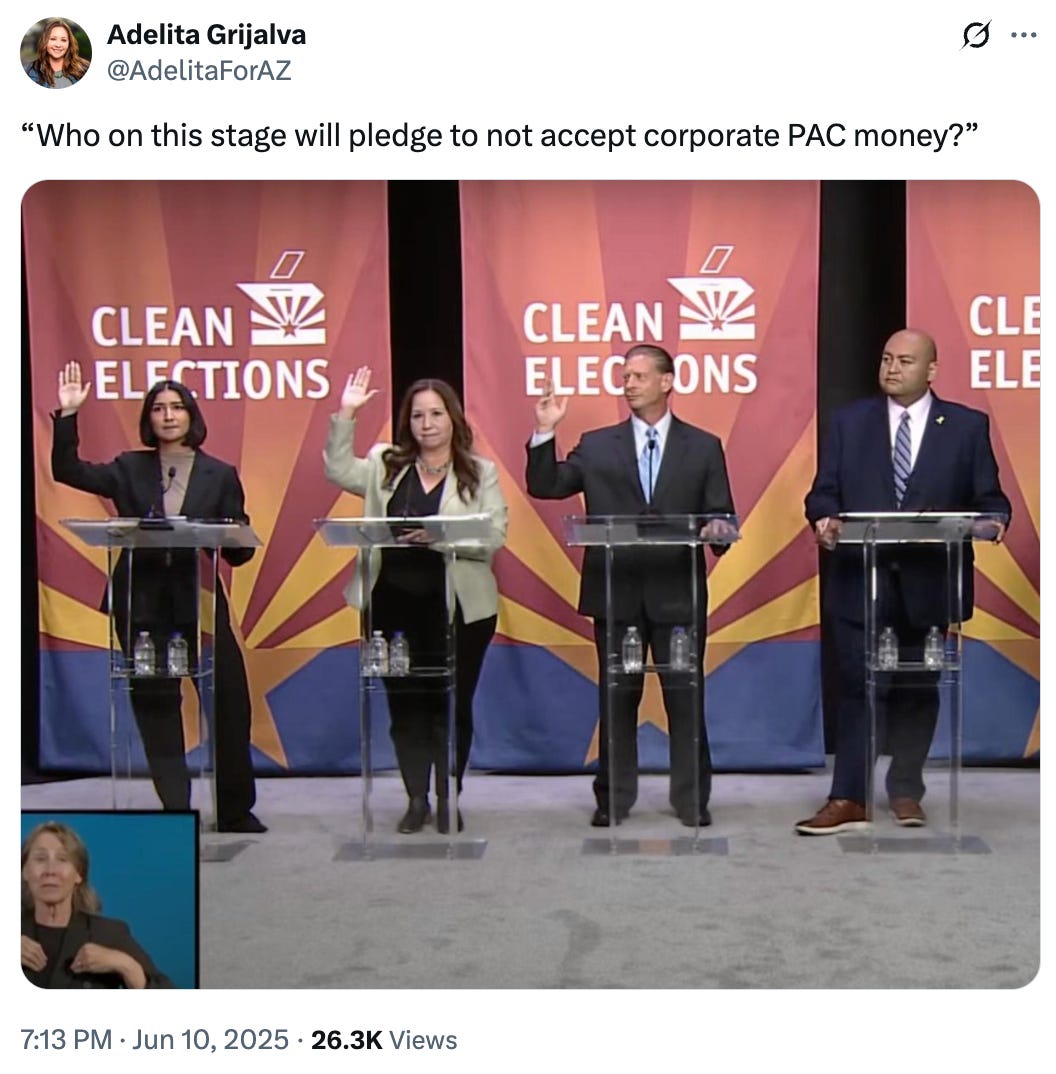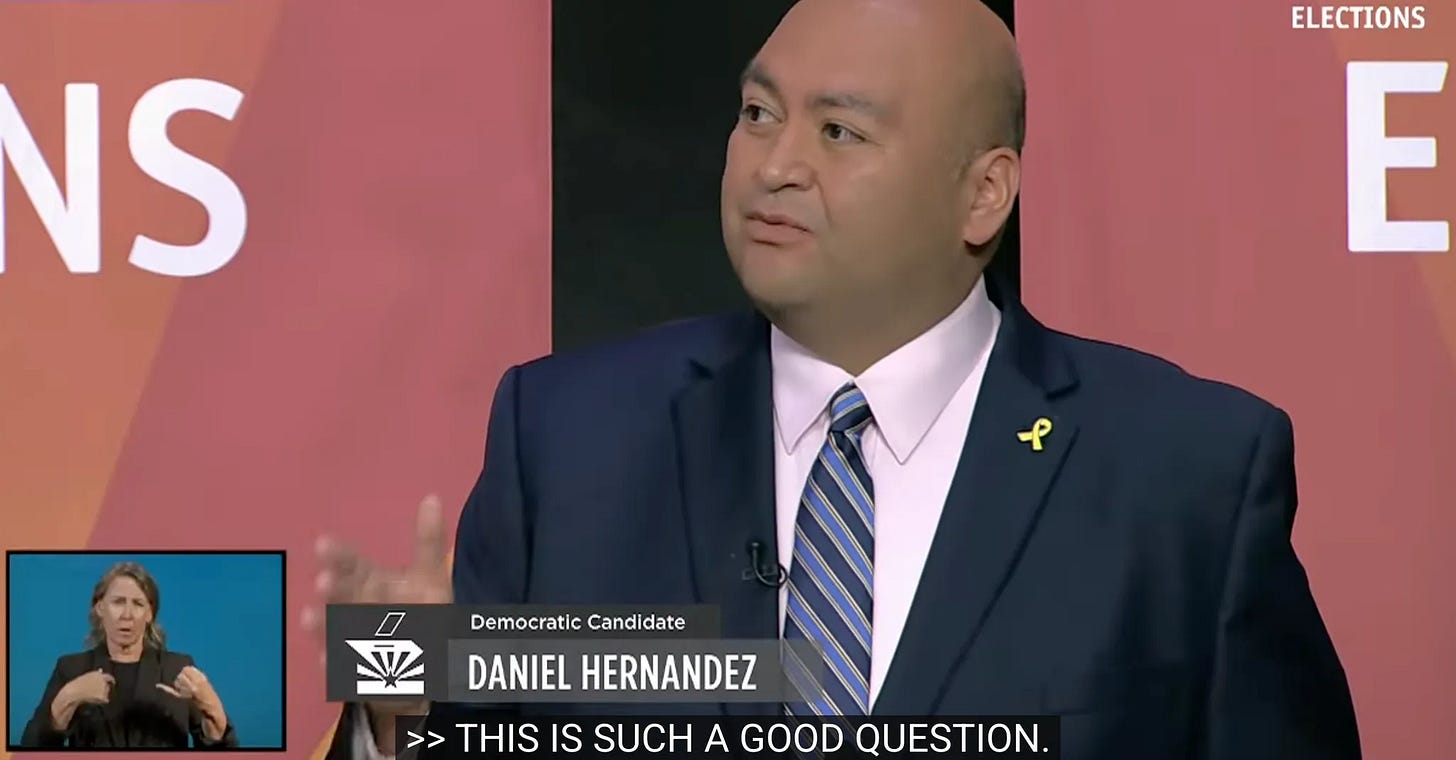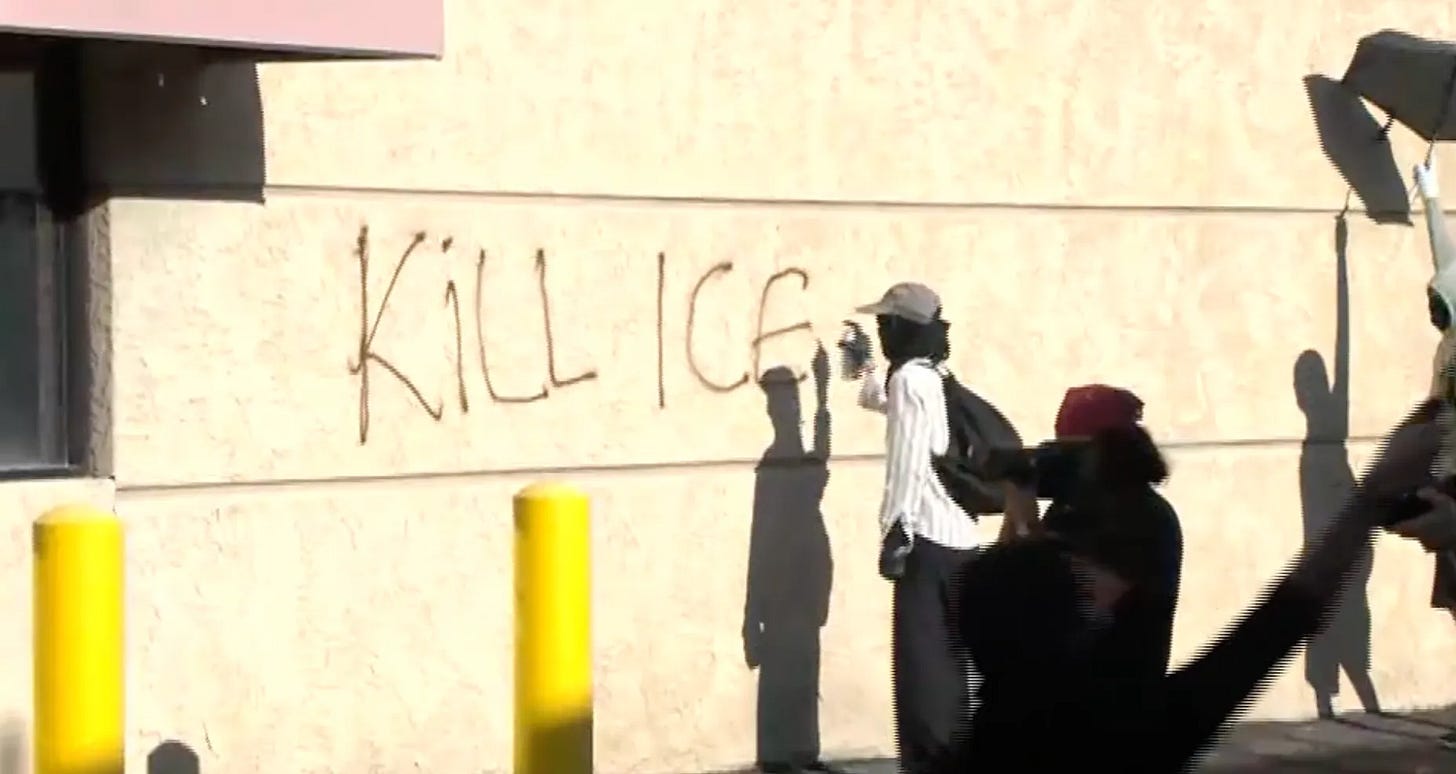Top 3 takeaways, Democratic debate
They didn’t answer the question … You wanna vote, right? … And I won the debate.
Attempting to keep five Democrats vying for U.S. Rep. Raúl Grijalva’s seat in Tucson’s deep-blue district on message — and actually answering the questions asked — for a full hour qualifies as doing The Lord’s work.
So we’ve got nothing but praise for moderators Steve Goldstein and Nohelani Graf, and for everyone at Clean Elections behind Tuesday night’s debate. Anyone who watched saw how much work it took to keep the candidates focused during an hour-long discussion on Congressional District 7 politics.
On stage, Deja Foxx, Adelita Grijalva, Daniel Hernandez, Patrick Harris, and Jose Malvido traded barbs — all knowing this highly televised debate was their last, best shot to make an impression before ballots went out. Several opted not to answer the actual question posed, using their time instead to lob attacks, stage quick political stunts, or shoehorn in pre-planned soundbites.
We’re ditching the typical “here’s how each candidate answered questions A, B, and C” format. This is the Tucson Agenda, and we do things a little differently.
So here are three moments that defined Tuesday night’s debate.
But if you care about Arizona politics — even if you’re not in CD7 — the debate is worth a watch.
The Pledge
Near the end of the debate, Foxx pivoted on a mining question to call on her fellow candidates to pledge not to take corporate PAC money.1
“I want to give everyone on the stage — because we won’t get to see financial disclosures until after voting has started — the chance to commit to not taking corporate PAC money. Is anyone willing to join me in that commitment? [Pause] Now you know who everyone on the stage works for,” Foxx said.
Everyone except Hernandez raised their hands, leaving the former state legislator in an awkward position after having just said:
“I’ve spent my entire career fighting for campaign finance reform to get money out of politics.”
After the debate, Hernandez responded by accusing Grijalva of lying about not taking corporate money — citing a 2024 campaign finance report from her re-election race for the Pima County Board of Supervisors. (She took $500 from Waste Management, for what it’s worth.)
To be clear: The question was about this race.
Still, Hernandez’s tweet drew fire from Democratic strategist Tony Cani, who posted screenshots of Hernandez’s spotty campaign finance filing record — which includes some hefty fines.
As of Wednesday, Hernandez’s account with the Arizona Secretary of State for his legislative campaign committee was listed as “suspended.”
A spokesperson for the Hernandez campaign said the treasurer passed away from Covid, leaving Hernandez locked out of campaign software.
“Daniel has proactively and consistently communicated with the Secretary of State’s Office to address this issue to regain access,” spokesman Dan Huff said.
The Finger
Wait. There is a better story than just Harris apparently flipping up the bird during Tuesday night’s debate.
Turns out it wasn’t an AI-generated moment. Harris was using his fingers to illustrate “five players” involved in a complex issue on federal healthcare costs.
“Any time a third-party payer, like UnitedHealthcare, negotiates a lower rate — and a lot of private payers do — the government can match that rate, saving taxpayer money,” Harris explained.
When moderators asked if he had intentionally flipped the bird, Harris clarified: Yeah, that finger was for his “old colleagues in healthcare.”
Lesson: Nobody loses political points for taking shots at insurance companies.
The Dodges
We rewatched the debate to count how many times the candidates didn’t answer the question asked.2
We even factored in the moments when Harris veered off into his “Cap the Cap” plan — the signature policy of his campaign. It’s a judgment call on our part, but we’d prefer specifics over canned pitches. (At one point, he encouraged voters to go watch his entire YouTube series on the proposal.)
Here is a good exchange:
Goldstein: Ms. Grijalva, one minute on this - How would you protect Medicaid specifically?
Grijalva: I believe that government works best for the people people when it's not getting dismantled from the inside. And so I think that when we're talking about Medicaid, I think what we're losing sight of is the fact that so many services in our K12 systems are provided to our young people through Medicaid and Medicare. And I think that when we look at those services like occupational therapy, speech therapy, counseling services, early interventions for our young people, those are happening there. I think the. We really do focus often on so many other populations. And I don't disagree with some of my colleagues, but I think it's important to note that half of the people that are going to be cut off of Medicaid are children.
The moderators kept candidates on their toes by rephrasing questions slightly from speaker to speaker, making it harder to anticipate the question.
But there was one common stumble:
How exactly do these candidates plan to achieve their political goals while serving in the minority in Congress? Most couldn’t answer that part of the question.
Just some quick reminders about upcoming election deadlines:
The last day to register to vote in the CD7 special election primary is June 16
Early voting begins (ballots mailed) on June 18
The last day to request a ballot by mail is July 7
Recommended deadline to mail back your ballot is July 8
The primary election is July 15
Not sure if you live in CD7? Check this handy map from the Pima County Recorder's Office.
Need to register or update your address? The Recorder’s Office can help with that, too.
A song of ICE and fire: Protesters and ICE contractors clashed near Country Club and Valencia roads yesterday afternoon after more than a hundred protesters started marching toward private security at the ICE office in Tucson. The contractors fired pepper balls, and protesters slung rocks and fireworks. Tucson police showed up, pushed back the crowd and detained several protesters, but not before protesters spray-painted the building and smashed a few windows, per KOLD’s Sean Mahoney, who was on the scene. Also, check out Daily Star photographer Kelly Presnell’s incredible pics of the fracas. Tucson Mayor Regina Romero and Police Chief Chad Kasmar put out a statement distancing the city from ICE, saying they’re ”monitoring recent federal immigration enforcement actions” and “recognize that these activities cause concern and uncertainty for members of our community.” A protest downtown went off without any issues.
“We fully respect the constitutional rights of individuals to peacefully assemble and express their views. … The department will continue to provide public safety support for gatherings and will only intervene if necessary to address criminal behavior that threatens people and property,” the statement reads.
Raúl still rules: The Tucson Federal Building on Congress Street near I-10 could be renamed after the late U.S. Rep. Raúl Grijalva, if legislation introduced by a bipartisan cast of Arizona members of Congress makes it into law, the Republic’s Sarah Lapidus reports.
Nobody reads your press release: Glamour magazine wrote a profile and Q&A with Congressional District 7 candidate Deja Foxx, talking about everything from growing up dependent on the social safety net to her political awakening and misogyny in politics. Meanwhile, Foxx hosted a meet and greet in Yuma yesterday, KYMA reports. And if you really wanna nerd out on Foxx content, she’s doing an ongoing mini documentary series with Democratic news outlet Courier News.
Glamour: The Democratic party clearly has rebuilding to do before the 2026 midterms. What do you think needs to change?
Foxx: I’ve worked behind the scenes of campaigns, and I’ve been on the front lines as an activist on the ground and a content creator online reading the comment sections. Democrats believe that we can govern from the top down — that is, if we craft the perfect press release and message, everybody’s going to hop on. That’s not how our media ecosystem works anymore.
Lawyers aren’t free: A group of lawyers who represent indigent defendants that the Federal Public Defender’s office is too overworked to handle are about to run out of money to pay their wages, the Daily Star’s Tim Steller reports. Congress passed a temporary spending bill earlier this year that didn’t include funding for the group of attorneys who handle a lot of border and immigration cases. Now they’re staring down the possibility of not getting paid from July until October, when a new budget will kick in.
“It’s not simply an inconvenience,” their representative, Corey Simon, told Steller. “We’re talking multiple months of not getting paid for legitimate hard legal work we’ll all doing.”
Cool code name: The super-secret “project blue” that Pima County officials have been discussing behind closed doors is a plan to bring a data center to a plot of vacant land near the Pima County Fairgrounds, KGUN’s Craig Smith reports. The county has been keeping it hush-hush as it attempts to close the $21 million deal for the land. It estimates it will bring in 3,000 construction jobs to build and another 180 ongoing employees earning an average salary of $64,000 per year.
We would love a salary of $64,000 per year. Help us get there?
If you can’t swim, quit: Monsoon season officially starts on Saturday, and meteorologists are expecting an above-average rain season, This is Tucson’s Sierra Blaser reports. And Pima County is giving out free sandbags to prevent potential flooding, per KGUN. Hopefully, those sandbags are enough, because President Donald Trump says he’s canceling FEMA after this year’s hurricane season, saying if governors can’t handle their own state’s problems, “then maybe they shouldn’t be governor,” CNN reports.
Radio about radio: Radio Campesina was born out of Cesar Chavez’s farm workers movement in the 1980’s, but has grown increasingly relevant in the Trump era with its “know your rights” segments that help explain immigration processes to their Spanish-language listeners, High Country News reporter Annie Rosenthal explains to Mark Brodie on KJZZ’s “The Show.”
“The anonymity of the radio allowed people to bring questions about navigating the immigration system, about health care, this kind of intimate space to help people navigate civic life,” she said.
A full 12 minutes after the debate on Tuesday ended, at least one candidate running for the Congressional District 7 Democratic nomination was certain who “won” the debate.
It was Deja Foxx, who sent this out to press outlets shortly after the debate ended.
But we appreciate the hustle in her email — the social media strategist even cut clips of her answers during the debate for the press to use.
For context, Foxx hadn’t been part of the earlier exchange about corporate influence — which began after Malvido accused Grijalva and Hernandez of being “bought and paid for.” While both were given a chance to respond, Foxx asked to weigh in and was denied.
Yep, like Harris, we count on our fingers. Your count might be different.












Thank you for acknowledging the political spin in the debate! It was dizzying. Great work keeping candidates across the spectrum accountable.
"How exactly do these candidates plan to achieve their political goals while serving in the minority in Congress? Most couldn’t answer that part of the question."
This isn't that difficult. You can't use the legislative process now, but Democrats won't always be in the minority. So you state it loud and clear that kowtowing to trump is betting it all on fascism. Let Paul Weiss, Columbia, ABC, etc. know that they will not be able to just return to normal when fascism is finally defeated. Their betrayals will be remembered, and whatever harm they thought trump would impose on them will be imposed on them under democratic rule to the full extent of the law.
If Democrats win back the House, start using committees to investigate the kowtowers' actions in caving to the trump admin, including whether they have been paying bribes through settling trump's frivolous lawsuits.